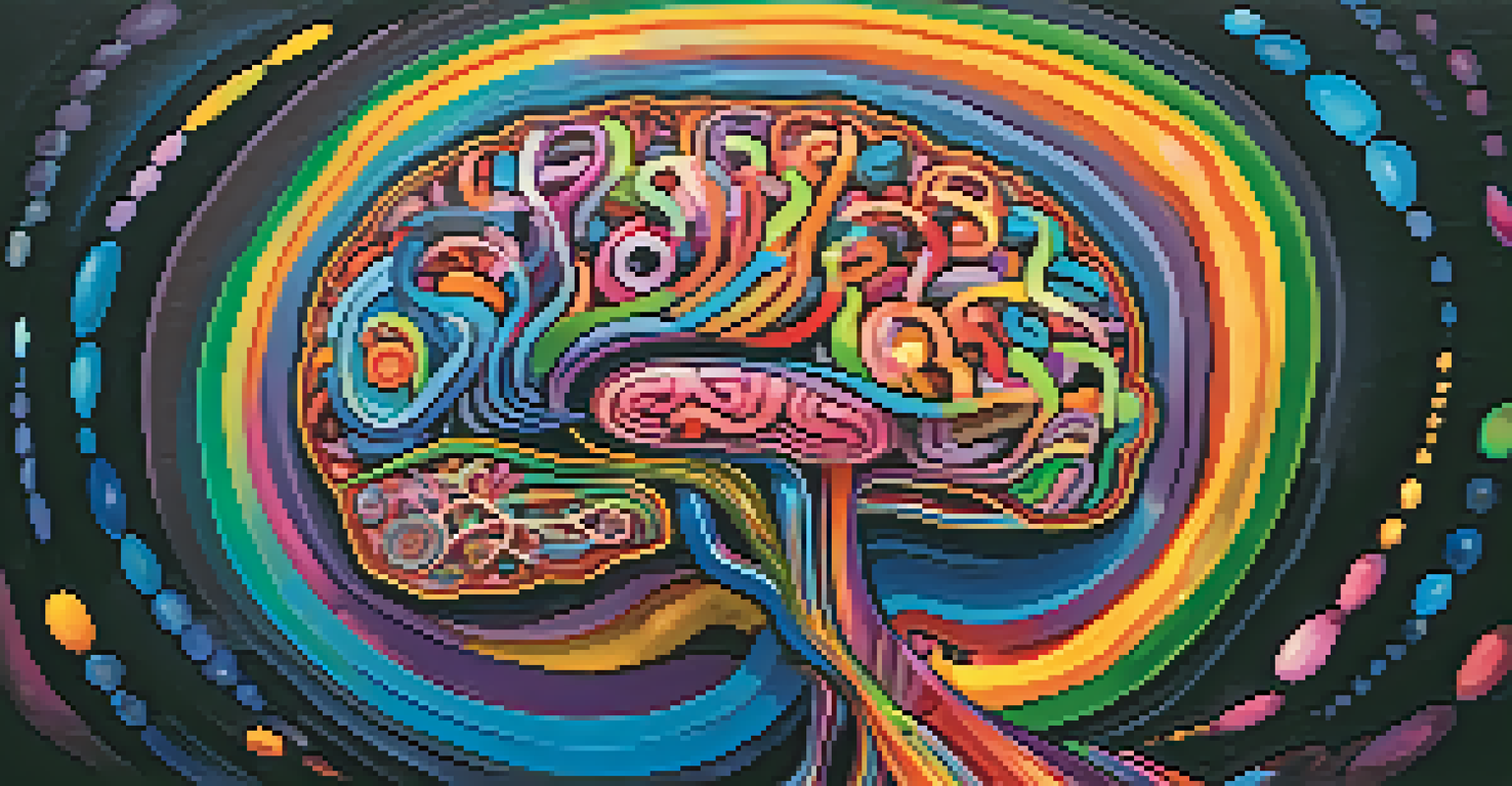Psychedelic Politics: A New Frontier in Activism

Understanding Psychedelics and Their Impact on Society
Psychedelics, often associated with counterculture movements, have recently gained attention for their potential therapeutic benefits. Substances like psilocybin and LSD are being studied for their effects on mental health, leading to a broader conversation about their role in society. This renewed interest has sparked a wave of activism aimed at changing laws and perceptions surrounding these substances.
Psychedelics can help us heal not just ourselves, but our communities and the world around us.
As more research emerges, it's clear that psychedelics can promote creativity, empathy, and even spiritual experiences. These qualities are particularly appealing in today's fractured political landscape, where understanding and connection are desperately needed. Activists are leveraging this knowledge to advocate for policy changes that reflect a more compassionate approach to mental health and drug use.
The intersection of psychedelics and activism presents a unique opportunity to challenge outdated norms and promote progressive policies. By combining scientific evidence with personal narratives, advocates are creating a compelling case for the decriminalization and responsible use of psychedelics in society.
The Rise of Psychedelic Activism in the 21st Century
In recent years, we’ve witnessed a surge in psychedelic activism, driven by grassroots movements and scientific research. Organizations like the Multidisciplinary Association for Psychedelic Studies (MAPS) are at the forefront, pushing for policy reforms and increased funding for psychedelic research. This collaborative effort illustrates a growing recognition of the importance of these substances in addressing mental health crises.

Activists are not only focused on policy change but also on educating the public about the benefits of psychedelics. Workshops, community events, and social media campaigns are vital tools for spreading awareness and combating stigma. By sharing personal stories and scientific findings, they aim to shift public perception and foster an open dialogue about the potential of these substances.
Psychedelics and Mental Health Benefits
Research shows psychedelics like psilocybin and LSD can effectively treat mental health issues, promoting a shift in societal attitudes towards their use.
The rise of psychedelic activism is also linked to broader social movements, including those advocating for racial justice and environmental sustainability. As activists connect the dots between these issues, they highlight how psychedelics can play a transformative role in healing both individuals and communities.
Case Studies: Successful Psychedelic Policy Changes
Several cities and states in the U.S. have already made significant strides in psychedelic policy reform. For instance, Denver became the first city to decriminalize psilocybin mushrooms in 2019, setting a precedent for others to follow. This milestone not only reflects changing attitudes but also serves as a case study for activists in other regions looking to replicate this success.
The therapeutic potential of psychedelics is just beginning to be understood, and the implications are profound.
Similarly, Oregon passed Measure 109, allowing the regulated medical use of psilocybin, making it the first state to implement such a program. The careful crafting of this legislation involved collaboration among lawmakers, activists, and mental health professionals, demonstrating the power of collective action. These examples show that with the right strategy and community support, change is possible.
These case studies not only inspire activists but also provide valuable lessons in navigating the political landscape. They underscore the importance of building coalitions, engaging with lawmakers, and employing data-driven arguments to advocate for change. As more areas consider similar measures, these success stories will likely serve as blueprints for future efforts.
Challenges Facing Psychedelic Activism Today
Despite the progress made, psychedelic activism faces several challenges. One significant barrier is the lingering stigma surrounding drug use, which can hinder public support for reform. Many people still associate psychedelics with the negative aspects of the drug war, making it essential for activists to reframe the narrative around these substances.
Additionally, misinformation and lack of understanding about psychedelics can create resistance to policy changes. Activists must work diligently to educate both the public and lawmakers about the benefits and risks associated with responsible psychedelic use. This effort requires comprehensive communication strategies that make complex scientific concepts accessible and relatable.
Rise of Activism for Policy Change
Grassroots movements and organizations are actively seeking policy reforms to decriminalize and regulate psychedelics, highlighting their potential for societal healing.
Finally, navigating the political landscape can be daunting, especially as interest in psychedelics grows. Activists must be prepared to face opposition from entrenched interests and remain adaptable to changing political climates. Resilience and a commitment to the cause are crucial for overcoming these obstacles and advancing the movement.
The Role of Science in Psychedelic Advocacy
Scientific research plays a pivotal role in psychedelic advocacy by providing evidence-based support for policy changes. Studies demonstrating the efficacy of psychedelics in treating depression, PTSD, and anxiety have bolstered the argument for their legalization and medical use. Activists leverage this data to engage with policymakers and the public, emphasizing the need for compassionate drug policies.
Moreover, ongoing research continues to uncover new therapeutic applications for psychedelics, expanding their potential impact on mental health. This evolving landscape keeps the conversation fresh and relevant, encouraging more people to consider the benefits of these substances. As the body of research grows, so does the likelihood of successful reform.
However, it's essential to approach this research with a critical eye. While the potential is promising, activists must advocate for responsible use and emphasize the importance of harm reduction strategies. By promoting a balanced view that acknowledges both the benefits and risks, the movement can foster informed discussions and drive meaningful change.
Building Community Through Psychedelic Experiences
Psychedelic experiences often foster deep connections among individuals, creating a sense of community that enhances activism. Many activists participate in guided psychedelic sessions or retreats, where they explore personal and collective healing. These shared experiences can ignite passion and commitment to social change, reinforcing the idea that healing oneself can lead to healing the world.
The communal aspect of psychedelics can also facilitate discussions about social justice, mental health, and environmental issues. By bringing people together, activists can brainstorm solutions and develop strategies to tackle pressing challenges. This collaborative spirit is essential for creating a robust movement that addresses the interconnectedness of various social issues.
Community Building Through Experiences
Psychedelic experiences foster deep connections among individuals, encouraging collaborative efforts to address social justice and mental health challenges.
Furthermore, community-building efforts often extend beyond the psychedelic experience itself. Activists frequently organize events, workshops, and support groups, ensuring that the sense of connection continues long after the experience. This ongoing engagement helps sustain momentum within the movement and fosters a culture of support and inclusion.
The Future of Psychedelic Politics and Activism
As the conversation around psychedelics continues to evolve, the future of psychedelic politics looks promising. Increasing public interest and expanding research are setting the stage for further reforms across the globe. Activists are optimistic that the momentum built in recent years will lead to more significant changes in legislation and societal attitudes.
The integration of psychedelics into mental health care and their potential as tools for personal transformation could reshape how we approach wellness and community building. As more people experience the benefits firsthand, advocacy efforts are likely to gain traction, making it easier to push for policy changes. This shift could also inspire a new generation of activists who see the value in using psychedelics as a means of promoting social change.

Ultimately, the future of psychedelic politics hinges on collaboration, education, and a commitment to compassionate policies. By continuing to advocate for responsible use and emphasizing the interconnectedness of various social issues, the psychedelic movement can pave the way for a more inclusive and understanding society.